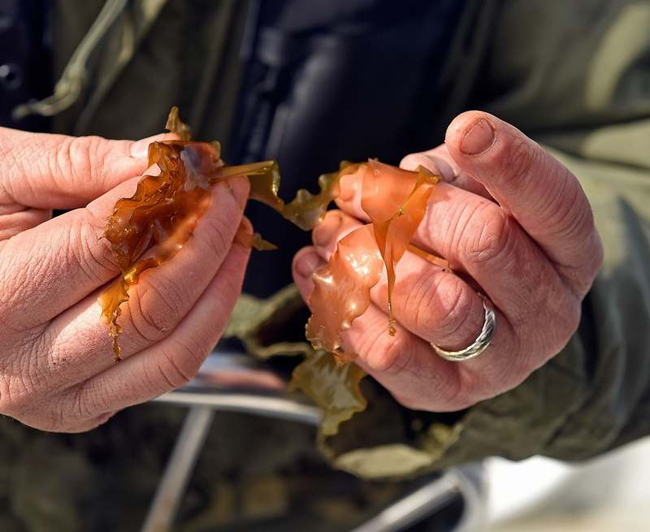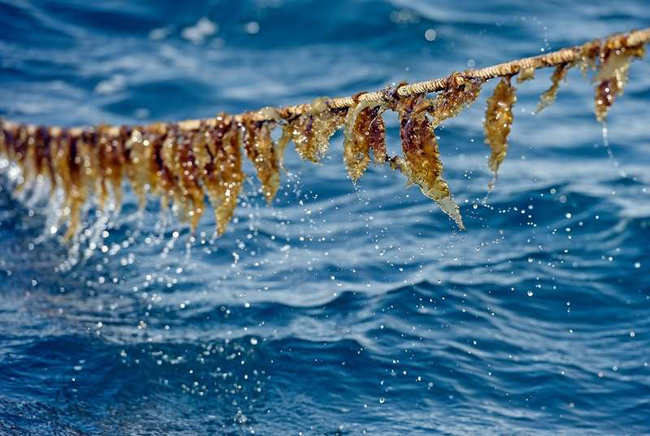
Kelp farmer J.P. Vellotti shows some of his kelp growing April 9, 2018, in his 5- to 6-acre farm in Fishers Island Sound off Bluff Point. Connecticut Sea Grant, supported by a $766,650 federal grant, will lead a three-year, multistate initiative to help the fledgling domestic kelp industry. Credit: Sean D. Elliot/The Day
— Published by The Day
New London, CT, February 11, 2021 - Connecticut Sea Grant, supported by a $766,650 federal grant, will lead a three-year, multistate initiative to help the fledgling domestic kelp industry.
The initiative targets nine states where “nascent seaweed aquaculture businesses are being impeded from further growth by the absence of comprehensive financial and management information resources,” CT Sea Grant said in a news release.
“This project will address two priorities identified through a comprehensive national needs assessment of various seaweed stakeholders, conducted as part of the National Seaweed Hub’s efforts,” said Anoushka Concepcion, Connecticut Sea Grant aquaculture extension specialist. “The first is to better understand the economics of seaweed farming in the United States, and the second is the need for assistance with developing business plans for prospective seaweed farmers.”
Through the project, economic analysis and business plans will be created for use by different types of kelp farms, as well as investors and lenders.
“The anticipated outcomes of this project include more access to capital, more informed business decisions by farmers, investors and lenders, increased employment, greater success of business and environmental improvements,” project leader Robert Pomeroy, University of Connecticut professor emeritus, extension specialist and marine resource economist at Connecticut Sea Grant, said in a statement.
Pomeroy will work with experts and colleagues in Sea Grant and university extension programs in New Hampshire, Maine, Rhode Island, Alaska, Washington, California, New York and Massachusetts.
The grant funds will pay mainly for staff time to research and analyze information on existing farms and markets, as well as varying regulatory and environmental conditions in different states.
More than 95% of the seaweed consumed in the U.S. is grown overseas. According to current estimates, about 1 million pounds of seaweed is harvested from U.S. waters, with forecasts that the market could expand to 4 million pounds annually by 2035. In Connecticut, there are currently 15 permitted kelp growing sites, with four of those growing product.

Credit: Sean D. Elliot/The Day
More Info: New York Sea Grant
New York Sea Grant (NYSG), a cooperative program of Cornell University
and the State University of New York (SUNY), is one of 34 university-based
programs under the National Oceanic and Atmospheric Administration’s
National Sea Grant College Program.
Since 1971, NYSG has represented a statewide network of integrated
research, education and extension services promoting coastal community
economic vitality, environmental sustainability and citizen awareness
and understanding about the State’s marine and Great Lakes resources.
Through NYSG’s efforts, the combined talents of university scientists
and extension specialists help develop and transfer science-based
information to many coastal user groups—businesses and industries,
federal, state and local government decision-makers and agency managers,
educators, the media and the interested public.
The program maintains Great Lakes offices at Cornell University, University at Buffalo, SUNY Oswego and the Wayne County Cooperative Extension office
in Newark. In the State's marine waters, NYSG has offices at Stony Brook
University in Long Island, Brooklyn College and Cornell Cooperative
Extension in NYC and Elmsford and Kingston in the Hudson Valley.
For updates on Sea Grant activities: www.nyseagrant.org has RSS, Facebook, Twitter, Instagram, and YouTube links. NYSG offers a free e-list sign up via www.nyseagrant.org/nycoastlines for its flagship publication, NY Coastlines/Currents, which is published quarterly.